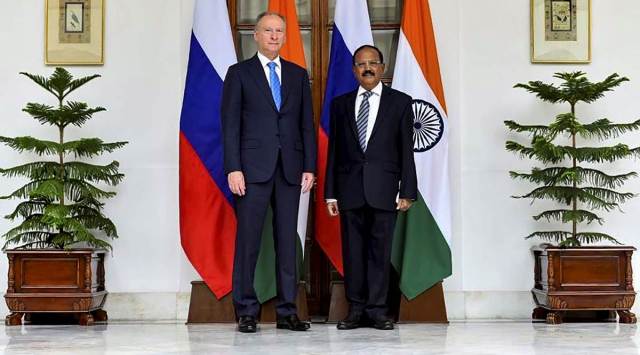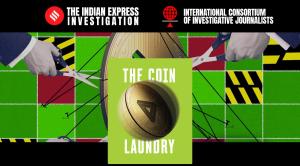THE EVOLVING situation in Afghanistan and its implications on regional security dominated the conversation at separate meetings that the top Indian leadership, including Prime Minister Narendra Modi, Foreign Minister S Jaishankar and National Security Advisor Ajit Doval, held with visiting Russian NSA Nikolay Patrushev and CIA chief William J Burns.
A Russian government statement said that following up on the telephone conversation between Modi and Russian President Vladimir Putin on August 24, an “exchange of views took place on the military, political and socio-economic situation in Afghanistan” at Patrushev’s meetings on Wednesday.

“The two sides reaffirmed their intention to strengthen coordination in the field of enhancing regional stability, including on the Afghan situation,” said the statement. They discussed “deepening bilateral cooperation in the field of security with an emphasis on further interaction on the anti-terrorist track, combating illegal migration and drug trafficking”.
Story continues below this ad
In contrast, Burns’ meetings with the top Indian leadership on Tuesday, especially in the security and strategic establishment on the situation in Afghanistan, was kept under wraps. Burns is learnt to have met Doval and top brass in the intelligence and security establishment.
Both Indian and American officials were tight-lipped about the visit, but several sources confirmed his visit and agenda — to discuss the Afghanistan situation. He is expected to go to Pakistan as well.
Burns had visited Afghanistan last month to meet the Taliban leadership, including Mullah Abdul Ghani Baradar. The visit came in the backdrop of the precarious security situation which posed a challenge for the US’s evacuation efforts.
According to the Russian statement, at the meeting between Patrushev and Doval, “attention was paid to intensifying joint work of both the countries’ special services and military bodies”.
Story continues below this ad
They also touched upon “humanitarian and migration problems in Afghanistan, as well as prospects for Russian-Indian joint efforts aimed at creating conditions for launching a peaceful settlement process on the basis of an intra-Afghan dialogue”.
In addition, the two sides agreed to “coordinate the approaches of Russia and India in multilateral formats on the Afghan settlement”.
The “importance of defining parameters of the future state structure of Afghanistan by the Afghans themselves, as well as the need to prevent the escalation of violence, social, ethnic and confessional contradictions in the country, were emphasised,” said the statement.
At the meeting with Jaishankar, an “exchange of views took place on a number of international and regional problems, including the situation in Afghanistan”.
Story continues below this ad
During the meeting with Modi, a wide range of issues of Russian-Indian cooperation, as well as a number of topics were touched upon.
The statement said that opportunities for further development of the special and privileged strategic partnership between Russia and India, including deepening political dialogue at the highest levels, were discussed.
“They also spoke about the prospects for strengthening interaction in multilateral formats, including the SCO and BRICS, as well as development of the Russian-Indian cooperation in the trade and economic sphere,” the statement said.
“High level-inter-governmental consultations on Afghanistan held today in New Delhi between delegation led by NSA Ajit Doval & delegation led by Secretary of Russian Security Council, Nikolay Patrushev. Two sides had detailed discussions on situation in Afghanistan,” tweeted Arindam Bagchi, official spokesperson of the Ministry of External Affairs.
Story continues below this ad
“Glad to meet Secretary of Security Council of Russia, Nikolai Patrushev. Very useful discussions on Afghanistan,” Jaishankar tweeted.
At South Block, the visit is being seen as a signal from Moscow, which has emerged as a key player in Afghanistan. Besides, India and Russia will be participating in two important virtual summits over the next 10 days — BRICS (Brazil, Russia, India, China, South Africa) and Shanghai Cooperation Organisation (SCO) — where the focus is expected to be on Afghanistan.
Modi will host the BRICS summit on September 9, which is expected to be attended by Putin. This will be followed by the SCO summit on September 16-17, when Modi is once again expected to encounter the Russian leader. Chinese President Xi Jinping is also likely to attend both the summits, with Beijing too emerging as a key player in Afghanistan because of Pakistan’s active role in helping the Taliban.
Last week, Putin had expressed hope that the Taliban would behave in a “civilised” manner in Afghanistan so the global community can maintain diplomatic ties with Kabul. “Russia is not interested in the disintegration of Afghanistan. If this happens, then there will be no one to talk to,” he had said.
Story continues below this ad
In Kabul, the Russian Ambassador had met with the Taliban several days after the takeover and said Moscow would maintain its embassy in the country.
On August 30, the United Nations Security Council, under India’s presidency, had adopted a resolution that gave de facto recognition to the Taliban as a state actor in Afghanistan. The resolution was adopted with 13 members, including India, voting in favour and none against. But Russia and China had abstained.
Vassily Nebenzia, Russia’s envoy to the UN, had said the resolution wasn’t specific enough about terror threats, did not speak of the “brain drain” effect of evacuation and did not address the economic and humanitarian consequences of Washington freezing the Afghan government’s US accounts.









